They call themselves a hot new advergaming company. Blogger opinions are already split on this, with some calling it a great idea and others arguing that it’s nothing but a fishy scheme. Last week, Moola’s CEO, Arlen Ritchie, gave me a presentation that stretched slightly over one hour. He gave the demo, I asked the questions. The result is below, God help us all.
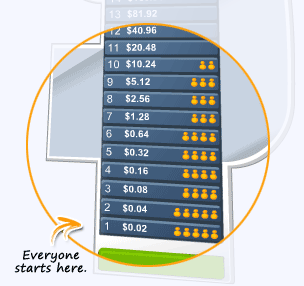
Join Moola Here
The introduction
Moola works on a simple premise. Basically, you play your pennies against other players in one of the mini-games available and try to climb the advertournament’s ladder. The catch? Nothing comes out of your pocket. It’s all advertisers’ money.
Before each game, the system makes you watch an ad that, according to Ritchie, is highly targeted. Then, you have to answer a question regarding said ad. And then it’s off to bidding your penny(ies) against someone else.
This is also found
href="http://www.businessandgames.com/blog/2007/11/interview_with_arlen_ritchie_m.html">Here
Ritchie: “We first envisioned it as a mobile game. We turned our attention to the web. Advertisers are now shifting, spending more online.” So they moved to the web but didn’t abandon the mobile idea. “We have designed our games to be ported to mobile, so that players can play while they’re on their mobiles [..] and play against players on the web or mobile to mobile or web to web..” He stops for a moment, having just lost the match he was playing. “So now, say I was playing against you – you just doubled your money.”
The game
They’ve built a rewards game, he tells me. You watch ads, play games, collect currency and it’s all part of a bigger game which is climbing the Moola tower. Exclusively on advertisers’ money. “Players can never deposit. That’s where we draw the line. Moola’s always free so you have to collect money from advertisers.”
How would one get more money into their account then?
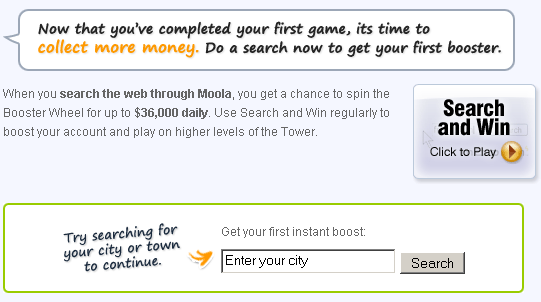
“ One of the ways you can do that is by using our search. […] Every time you do a search, the system randomly decides whether or not to give you a bonus.”
So they’ve got a custom search, complete with advertising and all. What does this entail then?
Ritchie: “We don’t motivate people to click on links. We only tell them to just use the search engine like they normally would.”
The other way players can actually collect is through an affiliate marketing program. “Let’s say I want to buy something at buy.com. So If you shop through Moola and buy something, we’re going to give you a portion of the commission that we receive.“
The toolbar
The demo continues with Ritchie showing me another feature that he seems rather enthusiastic about. He checks to make sure I’m aware of the press embargo before showing me the toolbar, something he calls “extremely unique”.
The Moola toolbar is a browser addon that indicates which merchants are connected to its cashback program. It indicates the amount you can receive in your Moola account for purchases (where available) and furthermore, whenever you’re on a website not affiliated with them, it provides you with links to Moola-connected websites offering the same service.
Social networking
Ritchie: “We wanted to build a social community around climbing the tower. We’re building profile pages, we’re gonna be tying it to Facebook so that you’ll be able to invite your friends from Facebook. Right now, we’ve been growing purely viral. It’s all done completely through word of mouth.”
The other side
So, say I have a brand – why do I want to get into Moola?
“The video ads are targeted individually to specific demographics users. We collect your age and postal code so that we can target those video commercials precisely.” Then, he argues, the question after the ad ensures that “each ad was watched and retained by your target. We tried to build it so it’s better than television, in terms of targeting and guaranteed impression.”
Me: On the other hand, people are already developing selective blindness to online advertising, such as banners. So what if, at a certain point, the users stop and say “Well, hang on, they’re making me all this advertising and for what? Nickels and dimes?” How do you plan on keeping them engaged?
Ritchie: "I think one of the differences between regular advertising, on sites where it’s not a part of the experience, is that I don’t welcome it because I’m there for the content, not for the ads. In Moola though, people realize that advertisers are paying their pennies so that they can play in the games for money.” And that changes the perception, Arlen Ritchie says. He promptly mentions that their users, unsolicited, “go on the forums and thank our advertisers for being very generous. They remember the ads because they’re answering trivia questions about the ads so it’s part of the experience.”
Me: Another thing I noticed; everybody seems to want an invite for some quick winnings, you created a good bit of buzz and I expect that after the 16th when you launch, it will grow even more. But, as a brand, why should I be bothered to advertise on a service whose users get overenthusiastic about cashing out 10$ checks? Another way of putting it is, who isn’t Moola for?
Ritchie: I’d say that the demographics of people who are attracted to Moola are very broad. There’s a lot to do, it’s much broader in appeal. The person who wrote Microsoft Word, he actually is retired now and he plays casino games. Well, he’s one of our gamers. He’s obviously extremely wealthy, very sophisticated but the concept of the competition and the novelty attracts a broad swad.
Me: So – let’s talk about the games? You have …three mini-games?
Ritchie: We’re creating something very similar to the Facebook patform. Anybody will be able to create a game and upload it and, when people play their game, they’ll get a percentage of all the money that goes through Moola and their game. Also, other gaming websites, like WorldWinner or King.com, will be able to Moola-enable their games. We look at it not as a destination only - you won’t have to come to Moola.com to play, you’ll be able to play wherever you encounter games that are Moola-enabled. And this will extend to different types of platforms. Right now, we’re talking to companies in the interactive television space that have games on set-top TV boxes and mobile games companies. They’ll also Moola-enable their games.
Me: In your vision, who is Moola competing with? I mean, I know there aren’t many similar ideas.
Ritchie: We’re not aware of anybody that’s doing something just like this and we see ourselves falling into a very unique opportunity gap. Right now there’s – on one side you’ve got casual games. They’re for free, they’re fun…
Me: And then, you’ve got online gambling sites, on the other hand.
Ritchie: Exactly, on the other side, you’ve got online gambling. And somewhere, more in the middle, there’s skill gaming. Skill games are legal but you still deposit your money. Moola is completely different. With Moola, it’s not your own money, it’s legal everywhere. And we can have every type of game that we want. We think it’s a unique market that’s not being serviced by the other games companies.
Gambling
Ritchie: We don’t use that word –gambling- we don’t market it as gambling but some people have looked at it and said ‘oh, it’s kind of like free gambling’. We just try to avoid the word because people, in the US mostly, are nervous about it.
Me: Okay, earlier you mentioned something that caught my interest. Namely, content creation. You said that people will be able to develop their own games, based on a toolkit or some such. How will that work? I mean, who will own the game in the end?
Ritchie: Who will own the game? The user. The developer.
Me: So, they can pull it off any time they want?
Ritchie: Right, like Facebook, you own your application.
Interesting figure
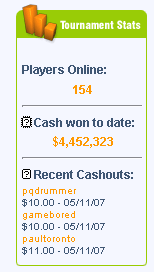
Ritchie: “Here’s an interesting figure too. You see this?” He points to a sidebar displaying ‘tournament stats’. “4.3 million? That’s the amount of money that people have exchanged in gameplay right now. And that’s what the game developers will make a percentage of and also, that’s just pennies. 4.365 million dollars worth of pennies exchanged in games. So that’s a lot of games.”
“Right”, I object “but that doesn’t make a total of 4 millions, does it? If the pennies moved around, isn’t it say the same 100.000 that went around to a lot of players?”
Ritchie: Right so, if the penny moves from me to you and then back to me, we count that as 2 cents. Every time it moves, we count it. It’s like a country’s GDP.
Me: So, it’s not exactly 4 millions. The reason I’m asking is because it’s a tad misleading, honestly. You see ‘cash won to date’ and you think it’s the amount of cash people went home with, you know?
“It’s displayed right here,” Ritchie shows me, clicking on the little question mark next to the figure “it says exactly how we count it. It always shows the cash won in games. So, when somebody wins a game, we add it to that figure.”
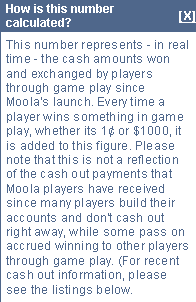
But what about this pyramid, I wonder. Gambling aside, people also mistrust pyramid schemes. So I ask – “you know – when someone says pyramid scheme, someone else says ‘What’s up with that? Oh, don’t bother.’ How do you reply to that?”
Ritchie: I think a referrals and invitations system like Gmail’s is very powerful for spreading a viral concept. So we looked at that system and at other systems, like network marketing, like Amway, and we’ve taken the best concepts from those and only used them where appropriate. So we don’t have any of the negative effects. In a pyramid scheme, you have to put your own money in. Moola is completely free. And players realize immediately that it’s a no-risk proposition.
Me: We’ve talked about money but, you know, as Moola grows, chances are that not everyone is going to go and cash out a big prize. And a lot of people will be just lingering down there. So, what will make them play? I want to play for fun. Let’s say I’m not interested in climbing [the tower] or I’m aware that I might not climb it. Why do I want to stick around? Say I want to play Moola for fun right? Say cash is a secondary goal.. Why will I have fun? Why will I stick around?
“Why do people post on somebody’s wall in Facebook?” he replies. “Why won’t they send them just a private message? It’s the idea that in a social community there are social factors that make people do stuff. Recognition is definitely a large one."
moolass6.PNG"Our forum users form a community and they have fun doing things. For example, they created Moola Big Brother. They create tournaments. And there’s a social aspect to it. When we introduced the leaderboard, something interesting happened which really illustrates the power of social dynamics. We had about a half dozen people email us, people who had already cashed out money. And they asked us to cancel that. The reason being, they wanted to be on the leaderboard. They wanted to be recognized by the community. So it’s part of the competitive and social aspect of gaming. And people look at it, I think, as something that’s fun in a social environment. “ The money, he says “is just a way of keeping score. It’s social gaming, really.”

Me: Again, on someone else’s money. [Sure sounds fun!]
Ritchie: Again, it doesn’t matter if you don’t make it, you never lost anything, you had fun. And then there are all the other social aspects that are driving a lot of them on.
Me: Any other directions that you’re looking to extend into? You’ve mentioned going outside Moola.com and on other gaming sites and you mentioned mobiles and whatnot. Anything else? Like virtual worlds for example?
Ritchie: More of the social aspect for example, right now we’re developing player profile pages where, in addition to earning money, you’ll be able to earn badges for achievements. So, if you accomplish something like – you play 500 games or you reach the 10 dollar level or maybe make 500 posts in the forum, you’ll earn badges that will be collectible and that you’ll be able to put on your profile page. Players will be able to see other people’s bounces, how they’re doing, how many games they played, those types of aspects. Also, for example, our members are building people avatars and they’re collecting money for doing it. They’re exchanging money. And, the way they exchange money right now, because we don’t have any opportunity for direct exchange, they go and play a private match and they lose on purpose so they can transfer money. So we’re building in more ways that people can treat Moola currency like regular currency so they can exchange it. There’s a whole economy aspect, kind of like the Second Life aspect, that we’ll eventually foster through some of the things we do.
Me: So far, how was the feedback from the companies you’ve been working with? I know it’s a bit early to ask this but if you can give me some names, some examples, some figures here.
Ritchie: We’ve been getting very good feedback – for example [shows me a list of brands]
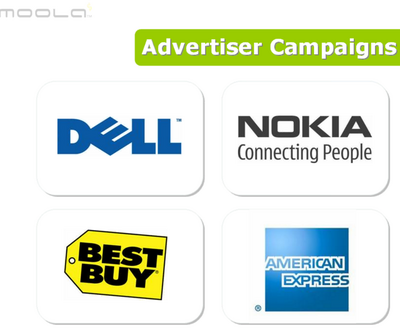
Here are some of the brands that we’ve had campaigns on Moola for. Thus far, we don’t have any direct relations with the advertisers, because we work with their agencies, but the agencies continue to send more ads, for example, yesterday, we’ve got a new campaign for Southwest Airlines. The feedback is mostly from the users. When you read the Michael Arrington post on Techcrunch, he said “they succeeded in getting the yellowpages.com ad stuck in my head.” So that’s the type of feedback that I think the advertisers are going to get and will appreciate.
Me: Yeah but, do I want an ad stuck in my head?
Ritchie: Well, the advertiser wants it stuck in your head. [laughs].
Conclusion:
All in all, I liked most of the ideas that Moola is based on, even if I’m not a fan of all it's about. To each his own, I suppose. Arlen Ritchie is more enthusiastic about it than I am but hey, that’s normal, right? Now it’s a matter of how they sell themselves, I should say. And of course, of how the public reacts in the long run. (What’s the difference between the two?) Of course, there are a number of things that can go wrong, from any perspective – not coming off as ‘clean’ enough; giving the perception that they’re catering more to advertisers than they are to players; being dismissed for being something to the likeness of a ‘penny arcade’; not managing to fill its niche properly and being overtaken by an even ‘hotter’ company; flopping on the entire ‘social’ aspect [a question my girlfriend asked when I showed Moola to her – ‘if they’re all about the social aspect, why can’t I even chat with the person I’m playing against?’]; insert your own example here. On the other hand, if they do play it smart, they can create something really cool that will last, for good or bad. Not to forget, one big plus is providing the API that enables people to develop their own games. It’s a good move and likely to attract a good bit of extra attention around Moola as developers will be promoting their own games. Also, people who might not be interested in gambling for pennies will look into Moola because of the open platform.
Now, as far as I’m concerned, I already have a few million accounts I don’t use on various social networks, the pennies idea rings in the back of my head in a way I dislike but still, I’m pretty curious about how they’ll build themselves up and extend. And how will their advertising model work in the long run. Excuse the poor metaphor but maybe, while the players are climbing Moola’s tower, Moola’s building a tower of their own. That should be interesting to watch, as long as they don’t – you know – get stranded up there. I suggested that we do a follow-up to this interview in six months, so we’ll see how it progressed then.
This blog is made for educational purposes only any information may be from other autors,in the help to improve your game experience.